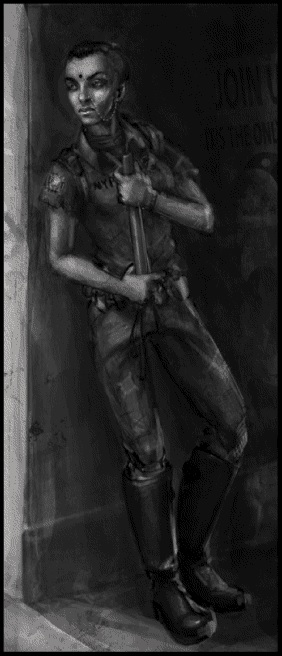
Fates Worse Than Death, one of my favourite RPG settings, is based around the gangs of near-future Manhattan. Each player chooses which gang their PC is in, and usually this leads to a group containing several gangs. As it is meant to be a very socio-political game, gang relations are important, and having players from gangs that are actively hostile, or even non-allied, will at the very least produce problems for the players. This concept is not limited to FWTD. Vampire (and other White Wolf settings) had a similar issue, with the player-base usually being a cross-Clan group.
Our latest idea for a game is to have all players be part of the same gang. While this will alleviate the multi-gang issue, it does have its own problems. In FWTD, a PC’s character class is their Gang, and this defines their Skill Costs (similar to how in V:TM your Clan defines what skills and Disciplines you have access to). By having all PCs from the same gang, they will all have the same Skill Costs (e.g. All Crackers have access to INFO Skills at 5xp/rank, compared to most other Gangs paying 10xp/rank. Sexologists pay 13xp/rank for TECH skills, while Boarders pay only 6!). While this helps to enforce niche-protection between gangs, and reflects the lifestyle of gang-members focusing on skills relevant to their gang, it can lead to players all buying the same, or similar skills. The skills are in categories, so one Cracker might buy Cryptography, and another choose Information Smuggling, but neither are likely to pick up much BIO (costing 9xp/rank, compared to a Needle Punk paying just 4!).

Part of the idea for a single-gang game was to get away from the finely-tuned adventuring party that can cover all bases (known as “Who’s Playing The Cleric?”) and focus on a group of people who happen to come together, and must use what skills they bring. If the players are Crackers, their BIO skills will be relatively low, unless someone decides to dedicate a lot of XP towards it (lowering their other areas significantly). A Sexologist group will be poor at TECH, and even their specialist will struggle to match a mediocre Boarder without giving up a lot of other skills! This does sound interesting (at least to me, as the GM!), but persuading my players that they are not the bestest-at-everything may be quite an undertaking.
One thing that FWTD does have is Disciplines. Areas of training that any Ganger may take. While learning a Discipline, a PC pays the Discipline costs for skills, rather than Gang costs. e.g. a Cracker may choose to train as an EMT. During this time, they will only pay 5xp/rank for BIO skills, but must pay 10xp/rank for INFO skills (as they are no longer at the heart of the information network, or as closely associated with their comrades). Some Disciplines have a specific list of skills that receive lower costs, and some have requirements for advancing (To begin EMT training a PC must have Driving 1, Emergency Medicine 1, and to gain Level 2 must have at least Emergency Medicine 3, Surgery 2).
So, to allow my players to broaden, and cover some extra skill areas, I am thinking of starting them at Level 3 (notably experienced), with the option to take one of those levels in a Discipline.
Next is to decide which gang to be! With over 50 different options, from homeless street-kids to inked’n’pierced carny-folk to idle-rich extreme sports enthusiasts, what will my players go for? One would like to be a Sat-Jumper; blue-collar workers who are jetted to low-orbit to work on the innumerable satellites that keep the world running. Another likes the idea of Technophiles, each specialising in a different technology. Whichever we end up with, I’ll report on how the game progresses!
What Gang would you want to play? Or how would you deal with the issues of running a single-gang game? Have you played/run a game like this? Why not let me know!
